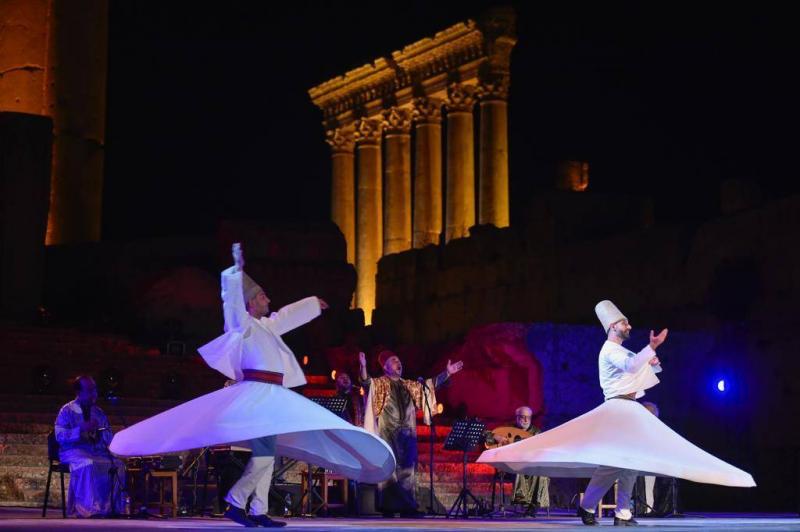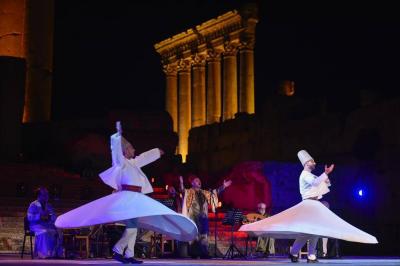A full moon of hymns and Sufi chants emerged from the Roman ruins of Baalbek, forming a crescent of the Al-Kindi Damascene Band, which presented a musical and poetic evening last Sunday evening. The performance included prayers, invocations, chants, and whirling dervish dances as part of the Baalbek International Festivals.
On the historic Roman Temple of Bacchus stage, a group of musicians, including a woman, adorned in traditional Sufi attire, conveyed spirituality through their clothing. The band returned to the Baalbek stage with new works titled "Sufi Ecstasy in the Whirling of Dervishes," overcoming difficulties, the passing of their founder, and the repercussions of the Syrian war on the band and its members.
Founded in 1983 by French-born Julien Weiss, who named himself Julian Jalal al-Din Weiss, in honor of the philosopher and mathematician Al-Kindi, the band continued its artistic journey under the management of Adil Shams Al-Din, an Alexandrian percussionist, after Weiss's death in 2015. The band features Sheikh Hamid Dawood, a Sufi chant singer from Syria, Khadija Al-Afreeq on the qanun from Tunisia, Ziyad Qadi Amin on the flute from Damascus, Mohamed Al-Qadri Dallal on the oud from Aleppo, along with other singers, including Diya Dawood and three dervishes from the Umayyad Mosque in Damascus.
The famous Halabi singer Omar Sarmini also participated as a guest in the evening, having not met the band for over ten years, during which he lived in Aleppo during the outbreak of the Syrian war in 2011. Festival President Nayla Doufrij stated that "the concert celebrated the 40th anniversary of the band's founding with Julien Weiss, who brought together musicians and singers from Aleppo and Damascus." She described the evening as a celestial breath, with harmonious, spiritual chants being a balm for the soul.
Hamad Yaghi, a spokesperson for the Baalbek International Festivals Committee, stated prior to the concert that "Damascene Sufi ecstasy is a representation of a poetic musical journey that blends invocations, prayers, and hymns of praise. It is a true poetic musical journey between prayer and chanting, characterized by deep religious emotion... religious Sufism amplified through the ecstasy dance performed by the dervishes."
The group sang "Allah Hayy.. Allah Hayy" alongside the dervish dance, repeating, "By Your praise, O my God, I begin my speech… I come to You, submissive, O my Lord, so be for me... If You do not pardon my sin, then who will? And You are Allah, our Gracious Lord."
Amid melodies from the Hijaz mode and Abrahamic prayers, the band performed the hymn "Salatina Ala Al-Nabi Al-Hashimi wa Taha Al-Nabi" in a spiritually charged atmosphere. The concert featured hymns and praises, including "If You Heal My Broken Heart" and "O Most Generous of Creatures, to Whom Do I Turn To If Not You?" and "O my God, O God of the Universe."
The peak of the invocations was in the hymn "Tala'a Al-Badr Alayna," historically recognized as the prelude to the arrival of the Prophet Muhammad in Medina. In a display of their love for Damascus and its Umayyad Mosque, the band also performed from the Syrian folklore repertoire.




